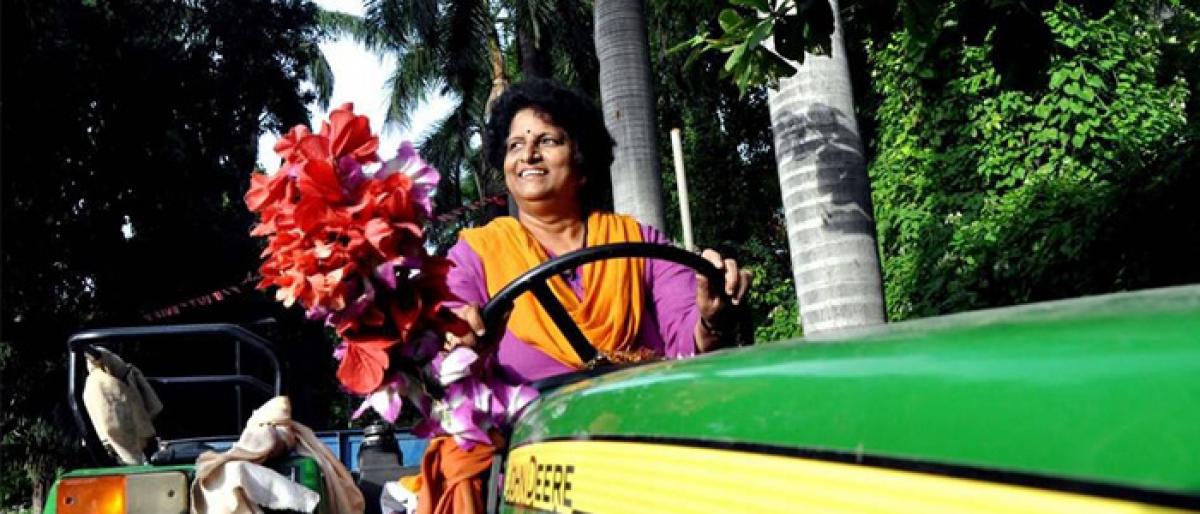Pages of Feminism in Bhumika

Telugu women\'s magazine \'Bhumika\', a monthly, has completed 25 years of its journey in bringing out women’s issues to larger public. The feminist magazine has never accepted any advertisement, except an occasional government one related to women. In these 25 years they might have taken 10 to 15 advertisements.
Telugu women's magazine 'Bhumika', a monthly, has completed 25 years of its journey in bringing out women’s issues to larger public. The feminist magazine has never accepted any advertisement, except an occasional government one related to women. In these 25 years they might have taken 10 to 15 advertisements.
Initially funding was a problem, but some good friends who donate to 'Bhumika' took it forward. K Satyavati, founder of 'Bhumika' shares her struggle during initial days and says, "When we started we had funding problems. We started a helpline in 2006, which is a 24 hour toll free number, where women can call for advice, counseling, or information (we have support centers in police stations and women cells) that helped us to get some funds.
Because of this helpline our financial problems got reduced and I started concentrating more on content. First issue came in 1993, January -March. Initially it was a collective work, and 'Anveshi' (Aanveshi Research Centre for Women's Studies) members are also behind 'Bhumika'."
You have seen feminist movement in literature across three decades. How do you see it in the context of ‘Bhumika’?
In 1980's many women started writing about their feelings, aspirations, struggles etc. Their subjects were untouched before feminist movement. So, hundreds of people started writing from 1980 to 1990. It was a golden decade. The feminist poetry anthology 'Neeli Meghalu' was released by 'Asmita'. All Telugu papers started women's page during that time. Women need a platform to write and that was the reason we started our magazine - to give space to women. Initially, only women used to write, we never allowed men to write. But later, even men started writing on women issues. There was a change in the language they used for women and government too stared supporting women and hijacked women’s agenda and started celebrating women's day as a part of it.
What do you think are the major milestones?
We have to see in both ways, what are the impacts on the society and in literature. In literature, many changes happened after feminist movement (after 1980). Women started writing on menstruation, child birth, relationship, transgender, HIV, etc.
However, they lag behind in writing on sex issues - that is still a stigma. Before feminist movement no body dared to write about these issues. Today, everybody is claiming that they are the feminists; previously that was not the case. When it comes to society, there is a huge change in all systems, they are not using abusive language for women and people think twice now before talking to us.
What would you consider as significant developments, law and policy wise as far as women are concerned?
The year 1975 was an important year for women and for the country too, this was the year when 'International Women's Day' was declared. Politically it was a dark and emergency period, but regarding women it was a good year in India. From that year 'International Women's Day' began to be celebrated and in the same year, for the first time, government of India had appointed a committee to study the status of women in India.
Mrs Jain was the chairperson of that committee. She was appointed to know status of women politically, economically and the findings were included in their study report, and based on that report many Acts came; Dowry Prohibition Act , 498 A, Domestic Violence Act etc. We have every Act today to save women. About the implementation, is another discussion altogether.
Is there still a need for dedicated feminist media?
Yes, because now we can see how media is responding to women's life, they are going into their bedrooms to bathrooms.
We expect sensitivity, but it is more about sensationalizing women's life. So, there is a need for sensitized media, may be in a feminist perspective.
What are the challenges ahead for feminist movement and women in general?
I feel the major threat is globalisation. What the government is saying about development is not development in a true sense. Development means people's life must be happy but now we are seeing a huge difference between the rich and poor. Because of this people are displaced and divided. It is very difficult to build a movement in such scenario. When Nirbhaya incident happened, protest came like a fire.
After that, so many cases happened, but nobody came out to protest and that is the problem. People are divided, their lives are busy with their livelihood, struggle for existence, and amidst all this, to build a feminist movement is very difficult.








